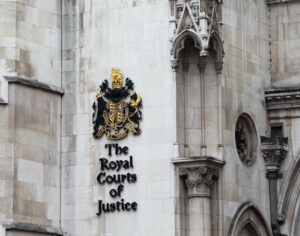Groklaw’s storied domain has fallen into unexpected hands. What’s behind the sudden flood of crypto content—and is the site lost for good?
Hopefully somebody with access will fix this, but it appears that for the time being Groklaw has been taken over by squatters. I’m not linking to it, because visiting the site might not be advisable right now, JavaScript being what it is and all.
I found out about this on Tuesday as I was reading the news of the day on the FOSS Force News Wire, where I found a short item — “The Groklaw Web Site Has Been Hijacked by Scammers” — on Techrights:
“Earlier this month we said that ‘Groklaw Static Site Relaunched With New Theme, But Many Pages and All the Comments Were Missing.’ Well, bad news. Maybe it was just some transitionary/ intermediary phase or maybe the site got cracked (or DNS misused).”

Techrights now displays a screenshot of a page with the familiar Groklaw masthead in the upper left part of the screen — looking as if it had been selected, copied, and pasted in place. Beneath the masthead is an article with the byline of Marian Neal above a headline: “Best Crypto Casinos & Bitcoin Gambling Sites of 2025 — Honest Reviews From Industry Experts.” If you were around back then, you know that’s definitely not a typical Groklaw headline.
Wanting to see for ourselves — but not wanting to put ourselves in jeopardy — we used a free screenshot service to come up with the shot that accompanies this article.
Some of you might shrug at this. After all, the site hasn’t been actively posting new content for a dozen years, which means you could be approaching 30 and have been a Linux user all your life and still be too young to remember Groklaw. You can take it from me, however, that 20 years ago if you used Linux — or probably even if you just used open source — you knew exactly what Groklaw was all about.
In 2008, when Groklaw won the Free Software Foundation’s 2007 Award for Projects of Social Benefit, Groklaw’s founder Pamela Jones described the site as “a place where lawyers and geeks could explain things to each other and work together, so they’d understand each other’s work better.”
Anybody who followed SCO’s attempts to sue Linux out of existence can attest that it was all that — and much more.
Groklaw: What It Was
For most of its 10-year existence Groklaw was mostly about explaining the law through the lens of SCO Group v. IBM, which was the infamous billion dollar lawsuit that shook the Linux world. Jones — who went by the name PJ — started the site in 2003 to cover legal news pertaining to free and open source software and explain complex legal issues in ways that technology professionals could understand.

Before Groklaw had a chance to get off the ground, however, what was left of the legendary Unix vendor Santa Cruz Operations — still bearing the same logo but with different ownership and now located in Lindon, Utah — infamously sued IBM for $1 billion, claiming that Big Blue was illegally copying code from SCO’s Unix properties into Linux. This upstart iteration of SCO had started life as a Linux company, Caldera, and adopted SCO’s name after it took ownership of the Unix-on-x86 IP that had originally been owned by old SCO.
Caldera had acquired rights to the code from Novell, another Unix vendor that was known for its business-focused networking software. At the time the lawsuit was filed, Unix’s place in the data center was falling fast, with Linux quickly finding dominance. Linux’s ascension was being aided by IBM, which in 2001 had famously committed to spending $1 billion on Linux development, which probably didn’t make it many friends among struggling Unix vendors.
During the SCO/IBM brouhaha, Groklaw took a front-and-center position as a go-to website for following the case — which most open sourcers saw as SCO vs Linux. For her part, Jones not only served as something of a play-by-play person throughout the legal proceedings, she also provided excellent commentary explaining the legalese in drop-dead simple layman’s terms.
Four years after SCO made itself perhaps the most hated company in Linux history, another unpopular company in open source circles, Novell, rode into court on a white horse. It testified that the deal granting its Unix rights to SCO didn’t include copyrights to the code, which technically brought an end to SCO’s case because without the copyrights it had no standing.
After that SCO’s death was long and slow — and remnants of SCO’s litigation efforts didn’t completely die until early this decade.
Groklaw After SCO
For another six years or so, Groklaw continued to report on the intersection of law and open source, but without the daily audience it enjoyed and pretty much without PJ, who quickly returned to private life. For years after the site quit updating, it remained online with all of its SCO coverage intact.
What’s happening to the site now isn’t clear: it could have been hacked or it could be that the domain name expired and some crypto folks have picked it up. Most of the information about the domain name is kept private, protected by the Greenland-based company Withheld for Privacy, and there’s nothing unusual about that these days. According to GoDaddy, the WHOIS database isn’t showing any activity around the domain: it was registered on October 3, 2003 and is set to expire on October 3, 2027.
However, it looks as if Groklaw as we knew it is gone, and that’s a loss to the community.
Christine Hall has been a journalist since 1971. In 2001, she began writing a weekly consumer computer column and started covering Linux and FOSS in 2002 after making the switch to GNU/Linux. Follow her on Twitter: @BrideOfLinux






